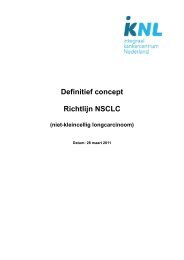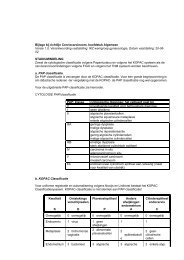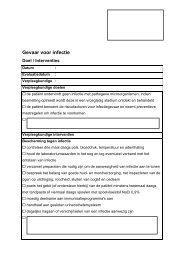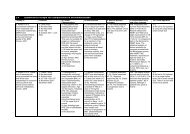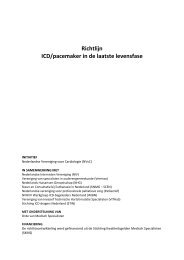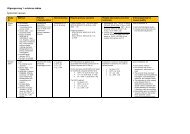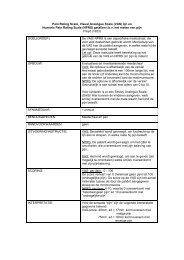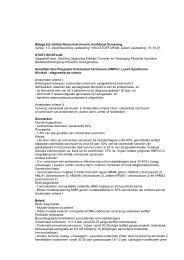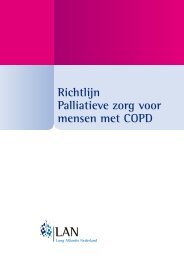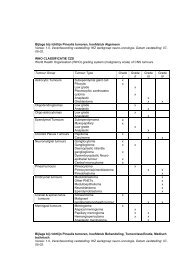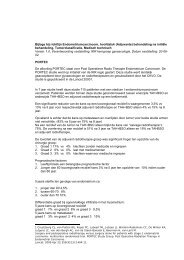Concept Richtlijn Erfelijke darmkanker 2007 versie 7 - Oncoline
Concept Richtlijn Erfelijke darmkanker 2007 versie 7 - Oncoline
Concept Richtlijn Erfelijke darmkanker 2007 versie 7 - Oncoline
Create successful ePaper yourself
Turn your PDF publications into a flip-book with our unique Google optimized e-Paper software.
Let op:• Personen met twee eerstegraads familieleden met CRC tussen de 70-80 jaar. Bij hendient één colonosocopie op 65 jaar te worden verricht, waarna surveillance volgensconsensus follow-up na poliepectomie volgt.• Personen met één aangedaan eerstegraads familielid met CRC boven de 50 jaar komenniet in aanmerking voor verwijzing naar een klinisch geneticus of voor surveillance.Literatuur1. American Gastroenterological Association. Medical position statement: Hereditarycolorectal cancer and genetic testing. Gastroenterology 2001:121:195-7.2. Anwar S, Hall C, White J, Deakin M, Farrell W, Elder JB. Hereditary non-polyposiscolorectal cancer: an updated review. Eur J Surg Oncol. 2000;26:635-45.3. Boland CR. Evolution of the nomenclature for the hereditary colorectal cancersyndromes. Fam Cancer 2005;4:211-8.4. de Bruin JH, Kievit W, Ligtenberg MJ, Nagengast FM, Adang EM, Ruers TJ et al. Meeropsporing van erfelijke <strong>darmkanker</strong> met onderzoek op microsatellietinstabiliteit bij door depatholoog geselecteerde patiënten met een colon-rectumcarcinoom. Ned TijdschrGeneeskd. 2005;149:1792-8.5. Burt RW. Colon cancer screening. Gastroenterology. 2000 ;119: 837-536. Johns LE, Houlston RS. A systematic review and meta-analysis of familial colorectalcancer risk. Am J Gastroenterol. 2001;96:2992-3003.7. de Jong AE, Vasen HF. The frequency of a positive family history for colorectal cancer: apopulation-based study in the Netherlands. Neth J Med 2006;64:367-70.8. Kievit W, de Bruin JH, Adang EM, Ligtenberg MJ, Nagengast FM, van Krieken JH et al.Current clinical selection strategies for identification of hereditary non-polyposis colorectalcancer families are inadequate: a meta-analysis. Clin Genet. 2004;65:308-16.9. Kievit W, de Bruin JH, Adang EM, Severens JL, Kleibeuker JH, Sijmons RH et al. Costeffectiveness of a new strategy to identify HNPCC patients. Gut 2005;54:97-102.10. Lindor NM, Rabe K, Petersen GM, Haile R, Casey G, Baron J et al. Lower cancerincidence in Amsterdam-I criteria families without mismatch repair deficiency: familialcolorectal cancer type X. JAMA 2005;293:1979-85.11. Lynch HT, de la Chapelle A. Hereditary colorectal cancer. N Engl J Med. 2003; 348:919-32.12. Menko FH, Griffioen G, Wijnen JT, Tops CM, Fodde R, Vasen HF. Genetica van<strong>darmkanker</strong>. I. Non-polyposis en polyposisvormen van erfelijke <strong>darmkanker</strong>. Ned TijdschrGeneeskd. 1999;143:1201-6.13. Umar A, Boland CR, Terdiman JP, Syngal S, de la Chapelle A, Ruschoff J et al. RevisedBethesda Guidelines for hereditary nonpolyposis colorectal cancer (Lynch syndrome) andmicrosatellite instability. J Natl Cancer Inst. 2004;96:261-8.14. Vasen HF, Boland CR. Progress in genetic testing, classification, and identification ofLynch syndrome. JAMA. 2005;293:2028-30.<strong>Concept</strong> landelijke richtlijn erfelijke <strong>darmkanker</strong> <strong>versie</strong> 7 d.d. 7 november <strong>2007</strong>.23





